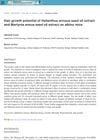 45 citations,
January 2012 in “Experimental Dermatology”
45 citations,
January 2012 in “Experimental Dermatology” Human hair follicles switch between active and resting phases unpredictably.
 16 citations,
July 2023 in “Acta biomaterialia”
16 citations,
July 2023 in “Acta biomaterialia” The study developed a new way to create hair-growing tissue that can help regenerate hair follicles and control hair growth direction.
 14 citations,
May 2022 in “Asian Journal of Pharmaceutical Sciences”
14 citations,
May 2022 in “Asian Journal of Pharmaceutical Sciences” New hair follicle-targeting treatments show promise for hair disorders but need more research on safety and effectiveness.
 July 2024 in “Clinical Cosmetic and Investigational Dermatology”
July 2024 in “Clinical Cosmetic and Investigational Dermatology” Exosomes can help promote hair growth and may treat hair loss.
June 2024 in “Regenerative Therapy” iPSCs show promise for hair regeneration but need more research to improve reliability and effectiveness.
 October 2023 in “Biomaterials”
October 2023 in “Biomaterials” Nanotechnology could improve hair regrowth but faces challenges like complexity and safety concerns.
 December 2022 in “Scientific Reports”
December 2022 in “Scientific Reports” Stem cells from whiskers can be transplanted to stimulate hair growth.
2 citations,
July 2023 in “Animals” FGF10 and non-coding RNAs are important for cashmere goat hair follicle development.
 2 citations,
April 2021 in “International Journal of Molecular Sciences”
2 citations,
April 2021 in “International Journal of Molecular Sciences” The study concluded that changing the culture conditions can cause sika deer skin cells to switch from a flat to a 3D pattern, which is important for creating hair follicles.
January 2025 in “Molecules” Caffeine may help with hair loss, but more research is needed to confirm its effectiveness.
Different genes and pathways are active in yak skin and hair cells, affecting hair growth and immune responses.

Justicia procumbens extract may help prevent hair loss and improve hair thickness and shine in a type of hair loss condition.
 October 2024 in “Biology”
October 2024 in “Biology” Dermal papilla cells can help regrow hair and are promising for hair loss treatments.

Certain natural products may help stimulate hair growth by affecting stem cell activity in the scalp.
 1 citations,
March 2024 in “International Journal of Pharmaceutical Sciences and Drug Research”
1 citations,
March 2024 in “International Journal of Pharmaceutical Sciences and Drug Research” Helianthus annuus and Martynia annua seed oils significantly promote hair growth.
December 2022 in “Molecular Pharmaceutics” Latanoprost-loaded nanotransfersomes could help treat hair loss by promoting hair growth.
 February 2024 in “Frontiers in physiology”
February 2024 in “Frontiers in physiology” Lymphatic vessels are important for skin repair and could affect skin disease treatments.
 10 citations,
June 2016 in “Wound Repair and Regeneration”
10 citations,
June 2016 in “Wound Repair and Regeneration” The microenvironment, especially mechanical forces, plays a crucial role in hair growth and could lead to new treatments for hair loss.
February 2025 in “International Journal of Bioprinting” 3D-printed scaffolds help regenerate hair follicles in lab-grown skin.
 10 citations,
October 2020 in “Frontiers in Cell and Developmental Biology”
10 citations,
October 2020 in “Frontiers in Cell and Developmental Biology” Wounds can regenerate hair in young mice, but this ability declines with age, offering insights for improving tissue regeneration in the elderly.
 17 citations,
December 2019 in “Stem Cells International”
17 citations,
December 2019 in “Stem Cells International” Bioactive molecules show promise for improving skin repair and regeneration by overcoming current challenges with further research.
 July 2023 in “Journal of Cutaneous and Aesthetic Surgery”
July 2023 in “Journal of Cutaneous and Aesthetic Surgery” Combining platelet-rich plasma with other treatments may improve hair growth in people with hair loss, but more research is needed.
 1 citations,
December 2023 in “Scientific reports”
1 citations,
December 2023 in “Scientific reports” 3D microenvironments in microwells improve hair follicle stem cell behavior and hair regeneration.
 38 citations,
June 2017 in “The Journal of Dermatology”
38 citations,
June 2017 in “The Journal of Dermatology” Aging in hair follicle stem cells leads to hair graying, thinning, and loss.
 October 2013 in “Faculty Opinions – Post-Publication Peer Review of the Biomedical Literature”
October 2013 in “Faculty Opinions – Post-Publication Peer Review of the Biomedical Literature” Three-dimensional culture helps dermal papilla cells grow new human hair follicles.
 3 citations,
May 2017 in “British journal of dermatology/British journal of dermatology, Supplement”
3 citations,
May 2017 in “British journal of dermatology/British journal of dermatology, Supplement” Certain cells around hair follicles help improve skin regeneration for potential use in skin grafts.
 March 2024 in “Chinese Chemical Letters”
March 2024 in “Chinese Chemical Letters” Tiny glowing gold particles can stop hair growth by blocking a specific cell signal.
 November 2022 in “Journal of Investigative Dermatology”
November 2022 in “Journal of Investigative Dermatology” Dandruff is linked to changes in the immune system of hair follicles and skin.
 7 citations,
February 2023 in “Inflammation and Regeneration”
7 citations,
February 2023 in “Inflammation and Regeneration” The protein interleukin-1 alpha helps regenerate hair follicles and increase stem cell growth in mice.
 July 2024 in “Pharmaceutics”
July 2024 in “Pharmaceutics” The new hydrogel treatment promotes faster hair growth and better skin health for hair loss.
























